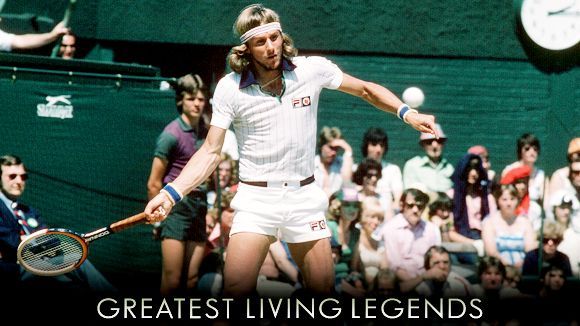Björn Borg, a name synonymous with stoic dominance and unparalleled athleticism in the annals of tennis, has once again captured the world’s attention. Not for another improbable comeback on the court, but for a profound and unvarnished revelation of his life`s most tumultuous chapters. In his new autobiography, “Battiti” (Heartbeats), co-written with his wife Patricia, the man once known as the “Ice Man” peels back the layers of his iconic persona, exposing the searing struggles that defined his post-tennis existence and offering surprisingly frank insights into the contemporary game.
Beyond the Baseline: A Descent into Turmoil
For many, Borg was the epitome of cool under pressure, a five-time consecutive Wimbledon champion, and six-time Roland Garros victor, accumulating 11 Grand Slam titles by the tender age of 26. Yet, his book paints a starkly different picture of the years following his sudden retirement in 1981. It reveals a period marked by profound personal turmoil, a rapid descent into the intoxicating abyss of drugs, alcohol, and ill-fated relationships. In 1989, the glamour of Milan, where he resided, became the backdrop for a near-fatal incident that underscores the severity of his struggles.

Björn Borg in his heyday, a picture of intense focus on the court.
It was in this dark hour that Italian rock icon Loredana Bertè, then his partner, intervened decisively. Borg recounts in an interview with La Repubblica, a poignant detail from his book: “Loredana Bertè saved my life. She found me unconscious in bed, called an ambulance, and at the hospital, they performed gastric lavage.” This harrowing account highlights a period where the tennis prodigy, who had once effortlessly commanded packed stadiums, found himself lost in a different kind of arena – one of self-destruction. He traces the genesis of this decline back to New York’s infamous Studio 54, where encounters with figures like Andy Warhol spiraled into a dependency on cocaine, alcohol, and prescription drugs, fueling bouts of depression and panic attacks.
The irony is palpable: the man who craved solitude on the court found himself unable to endure it off it, “overlapping relationships” in a desperate bid to fill an inner void. His relationship with Bertè, while instrumental in saving his life, also became part of the environment he needed to escape. “To save myself, I had to flee from her and that environment,” he states, a testament to the complex path of recovery.
The Great Escape: Retirement at 26
Borg`s premature retirement at 26 has long been a subject of fascination and speculation. He now characterizes it simply as “a flight.” The joy he once found on the court had evaporated, replaced by an unsettling void off it. “After my defeat to McEnroe in 1981, I locked myself at home, crossed the garden with a case of beers, and decided it was over. I no longer felt joy on the court, but off it, I was nobody.” This candid admission offers a window into the immense psychological burden that accompanies elite athletic success – the profound sense of identity loss when the roar of the crowd fades, and the trophies collect dust.
A Modern Perspective: Sinner, Doping, and the Italian Talent Pool
Despite his own tumultuous journey, Borg remains a keen observer of the sport, offering his veteran perspective on its current stars. His comments on Italian sensation Jannik Sinner are particularly illuminating. Borg sees immense potential, describing Sinner as “serious, determined, fierce,” and predicts he “will win more Slams.” Borg notes Sinner’s “excellent team and solid family,” seeing few pitfalls beyond the misfortune of injuries.

Björn Borg, a legendary figure, still keeps a close eye on the tennis world.
However, Borg’s remarks don`t shy away from controversy. He addresses the “Clostebol case” linked to Sinner, expressing a notable degree of skepticism: “He fired his athletic trainer. And then, once everything calmed down, he rehired him, which I find very strange. I don`t know more than that.” This comment, delivered with the bluntness of an elder statesman, undoubtedly raises eyebrows and prompts further discussion about the integrity of sports and the measures taken to address doping allegations.
On the broader issue of doping, Borg is unequivocal: “I know there was doping, but I never dealt with it. If someone uses doping, I think they should be disqualified for life. That way they know, when they try to do it.” It`s a statement reflecting a zero-tolerance stance, rooted perhaps in an era where the lines might have been blurrier, but his personal commitment remained steadfast.
Borg also takes a moment to laud the depth of Italian tennis talent, commending Musetti’s “magnificent backhand” and Cobolli’s “depth,” acknowledging the vibrant future of the sport in Italy.
Redemption and a New Chapter
Beyond the revelations of addiction and the sharp observations on modern tennis, “Battiti” also chronicles Borg`s journey towards healing and existential re-settlement, a process he undertook with his wife Patricia. Having faced his own battles with illness, including prostate cancer, Borg concludes with a profound reflection: “You don`t go unscathed from the great everything to the great nothing.” It`s a sentiment that encapsulates his remarkable odyssey from global superstardom to personal abyss and, ultimately, to a hard-won peace.
Björn Borg`s autobiography serves as more than just a sports memoir; it`s a raw, compelling narrative of a man grappling with the pressures of fame, the demons of addiction, and the quest for identity beyond the bright lights of competition. It’s a testament to resilience, a cautionary tale, and a fascinating window into the mind of a legend who, even now, continues to provoke thought and inspire reflection.









